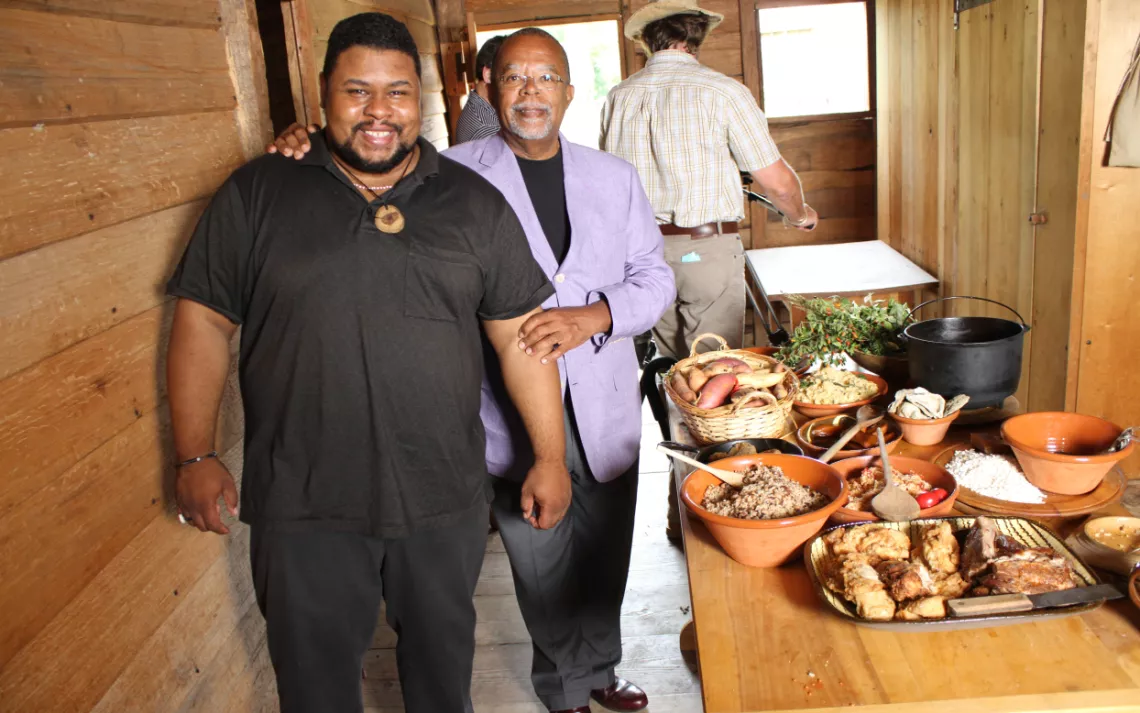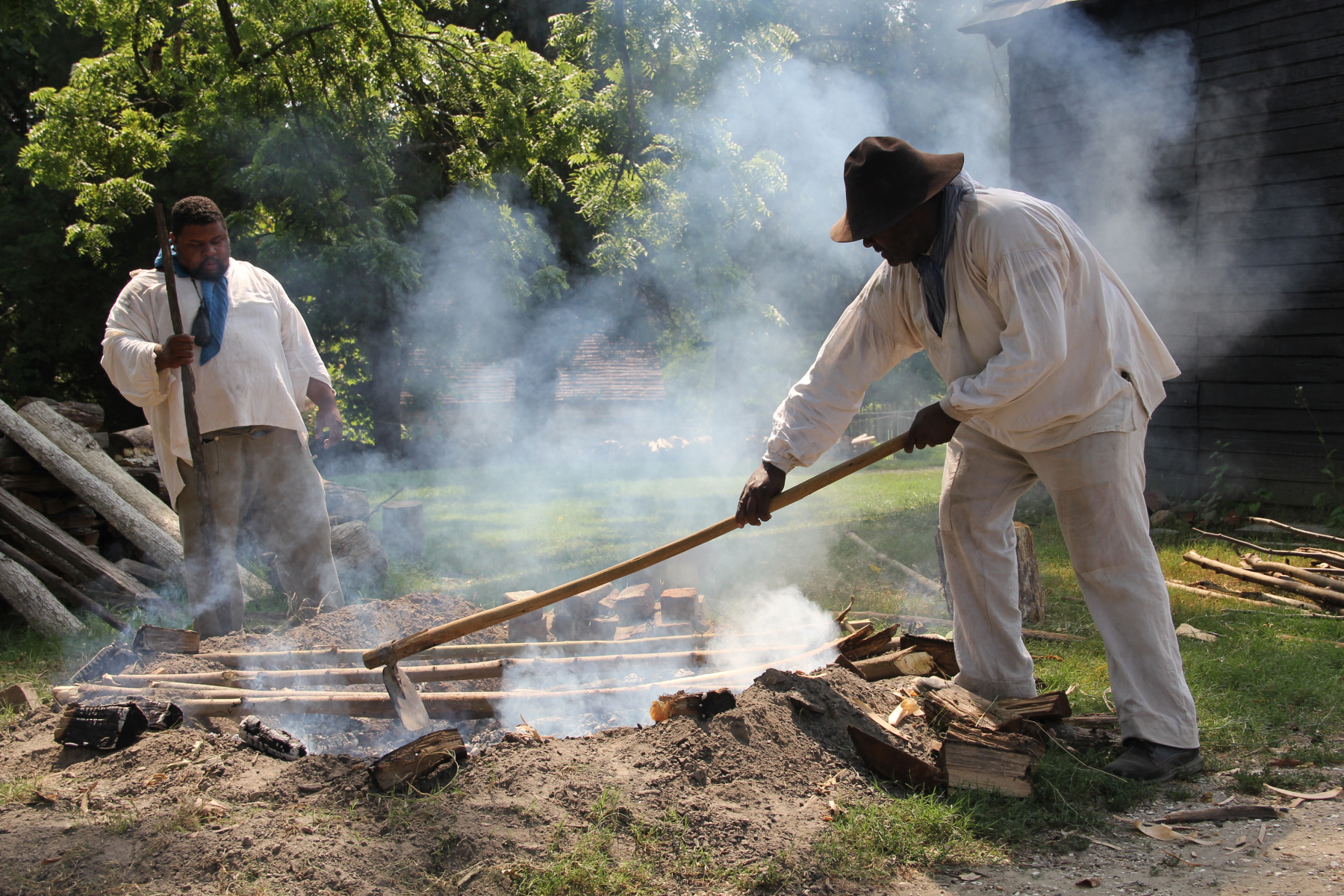Preserving African American Foodways

Michael Twitty with Harvard scholar Henry Louis Gates, Jr., during the taping a 2013 PBS series about African American history. | Photo by Jacob W. Dillow
Whether you're preparing a special holiday dish, growing seeds that have been passed down over generations, or just enjoying an ordinary meal with friends, the cultural traditions that shape how we consume and produce food—collectively known as "foodways"—are central to how we connect with our families and our communities. And more often than not, when we honor our cultural food practices, we also nourish the natural environment. Traditional foodways are typically associated with local agriculture and sustainable farming techniques like interplanting (i.e. growing different crop varieties together so as not to exhaust the soil), as well as the conservation of rare heritage crop varieties.
In Washington D.C., one culinary-historian-turned-writer is on a mission to preserve the foodways of historic African American communities and what he calls their "parent traditions" in Africa and the Diaspora. Michael Twitty is the founder of the Afroculinaria food blog, where he documents his efforts to grow and collect crops using traditional methods, and shares his recreations of historical recipes that date back to when the first Africans were brought to North America as slaves. Sierra spoke with the food writer by email about his favorite food groups (rabbits get their own subcategory), his new book, The Cooking Gene, and what traditional foodways can teach us about the history of African American oppression and resistance.
How did you first become interested in culinary and food history?
I'm an autodidactic type. When I was very little I took a deep interest in how people of the past ate. I was particularly interested in how Native Americans got sustenance from their environment, because I was living on their land. The thought of people eking out a living from the world I saw around me was endlessly fascinating to me. I thought a lot about antiquity and Medieval times and, eventually, my mind wrapped around to asking the question, how did my culture—African American culture—come to eat the way it did and where did our food come from? I've been trying to answer that question ever since.
What are some of heritage crops that you grow and the wild foods you have cooked with?
I cultivate sorghum, okra, watermelon, peanuts, rice, corn, eggplants, beans, cowpeas, and other crops that were particularly important to colonial and antebellum black life. They weren't just growing stuff—they were cultivating resistance. First and foremost, they were preserving the memory that they were a distinct people—Africans living in exile. I grow my crops using the interplanted method my ancestors grew them in. I cook the four food groups (LOL)—rabbits, squirrel, possum and coon—as well as persimmons, peppergrass, lambsquarters, dandelion, and spicebush, among many other things. The main point is to give people a taste of something completely different that exposes them to the diversity of the African American food tradition and our deep and intimate relationship with the environment.

Michael Twitty and Robert Watson experiment with a "colonial Afro-Virginian barbecue" in Colonial Williamsburg. | Photo by Jacob W. Dillow
What do these traditional foodways tell us about the African and African American relationship to land and place?
Unfortunately when you have people moved off of the land because of taxes and lack of resources, and you have the privatization of beaches and other water access, you lose the land as a source of subsistence. We are a community that is plagued by environmental racism. We need a greater connection with nature as we once had, but due to economic constraints and changes in day-to-day life, that's tough. We were once a rural people who grew much of our food and lived off of the land, but at the same time we were living under one of the most brutal systems in the world—Jim Crow. Landscapes of oppression often overlap with landscapes that are important to food and survival. That's a deep issue for us.
Why are these traditions and history relevant today?
A lot of Americans have to rely on processed foods and many African Americans who live in urban locales live in food deserts or areas of high food insecurity—meaning that access to a grocery store or healthy food options are limited or don't exist. By getting people to grow food, participate in projects that forage, fish, or raise chickens, or have community gardens or Community Supported Agriculture, I am asking African Americans to return to parts of their tradition that improve the health of the land, get people active, and engage people of different ages across the generations. Health isn't just about eating nutritious food—it's mental, spiritual, communal, environmental, and physical in nature.
What projects are you working on right now?
I wanted to write a book that brought readers from Africa to America, and from slavery to freedom, tracing my family as a stand-in for African Americans to show how food affects our lives and how it contributed to the way our culture developed. My upcoming book, The Cooking Gene, is a food memoir with a bit of food history, and a bit of genetic mystery.
Do you have any advice for people who want to connect to traditional foodways?
Go eat with your neighbors. Support local businesses that reflect the cultures, talk to the cooks, and get your hands dirty. And be sure to help clean up!
 The Magazine of The Sierra Club
The Magazine of The Sierra Club



